#I’m playing a couple zelda games at the moment. maybe I’ll post some art from those too
Explore tagged Tumblr posts
Note
hi omg!!!! you are such a talented artist and i love browsing your blog whenever i have free-time, it means SO much to me that your art exists!!! sorry for the constant exclamation marks i'm just too happy and excited to send this!! thank you for every art piece you post, i adore it!! also, hell yeah, fellow Skyward Sword enjoyer i see :3 such a good but sadly underrated Zelda game imo, same with Twilight Princess i honestly think; but oh well! thank you so much for..merely existing ig! :D sorry for the long ask btw ;-;'

Aaa tysm! I appreciate your submission, no need to apologize haha. Both Skyward Sword and Twilight Princess are still my favorite zelda games (I still can’t choose) so I’m happy to see the love people still have for these games! I could seriously talk about them forever. Thank you for your sweet comments!
#I’m playing a couple zelda games at the moment. maybe I’ll post some art from those too#legend of zelda#peachie asks
156 notes
·
View notes
Text
Growing Pains - Zelda, Tony Hawk, The Sims, games and related memories from my formative years
This blog post is about my personal history with video games, how they influenced me growing up, how they sometimes helped me, and more or less an excuse to write about associated memories with them.
This is a very straightforward intro, because I’ve had this post sitting as a draft for ages, trying to glue all of it cohesively, but I’m not a very good writer, so I never really succeeded. Some of these paragraphs date back at least one year.
And I figured I should write about a lot of this as long as I still remember clearly, or not too inaccurately. Because I know that I don’t remember my earliest ever memory. I only remember how I remember it. So I might as well help my future self here, and give myself a good memento.
Anyway, the post is a kilometer long, so it’ll be under this cut.
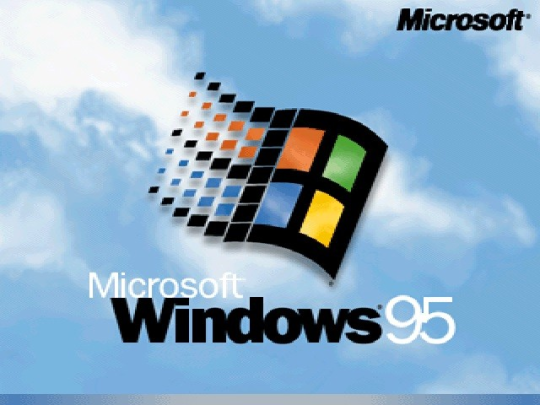
My family got a Windows 95 computer when I was 3 years old. While I don’t remember this personally, I’m told that one of the first things I ever did with it was mess up with the BIOS settings so badly that dad’s computer-expert friend had to be invited to repair it. (He stayed for dinner as a thank you.)
It was that off-white plastic tower, it had a turbo button, and even a 4X CD reader! Wow! And the CRT monitor must have been... I don’t remember what it was, actually. But I do once remember launching a game at a stupidly high resolution: 1280x1024! And despite being a top-down 2D strategy, it ran VERY slowly. Its video card was an ATI Rage. I had no idea what that really meant that at the time, but I do recall that detail nonetheless.
Along with legitimately purchased games, the list of which I can remember:
Tubular Worlds
Descent II
Alone in the Dark I & III
Lost Eden
Formula One (not sure which game exactly)
Heart of Darkness
(and of course the famous Adibou/Adi series of educational games)
... we also had what I realize today were cracked/pirated games, from the work-friend that had set up the family computer. I remember the following:
Age of Empires I (not sure about that one, I think it might have been from a legitimate “Microsoft Plus!” disc)
Nightmare Creatures (yep, there was a PC port of that game)
Earthworm Jim (but without any music)
The Fifth Element
Moto Racer II
There are a few other memorable games, which were memorable in most aspects, except their name. I just cannot remember their name. And believe me, I have looked. Too bad! Anyway, in this list, I can point out a couple games that made a big mark on me.
First, the Alone in the Dark trilogy. It took me a long time to beat them. I still remember the morning I beat the third game. I think it was in 2001 or 2002.
youtube
There was a specific death in it which gave me nightmares for a week. You shrink yourself to fit through a crack in a wall, but it’s possible to let a timer run out—or fall down a hole—and this terrifying thing happens (16:03). I remember sometimes struggling to run the game for no reason; something about DOS Extended Memory being too small.
I really like the low-poly flat-shaded 3D + hand-drawn 2D style of the game, and it’d be really cool to see something like that pop up again. After the 8-bit/16-bit trend, there’s now more and more games paying tribute to rough PS1-style 3D, so maybe this will happen? Maybe I’ll have to do it myself? Who knows!
Second, Lost Eden gave me a taste for adventure and good music, and outlandish fantasy universes. Here’s the intro to the game:
youtube
A lot of the game is very evocative, especially its gorgeous soundtrack, and you spend a lot of time trekking through somewhat empty renders of landscapes. Despite being very rough early pre-rendered 3D, those places were an incredible journey in my young eyes. If you have some time, I suggest either playing the game (it’s available on Steam) or watching / skimmering through this “longplay” video. Here are some of my personal highlights: 25:35, 38:05, 52:15 (love that landscape), 1:17:20, 1:20:20 (another landscape burned in my neurons), 2:12:10, 2:55:30, 3:01:18. (spoiler warning)
But let’s go a couple years back. Ever since my youngest years, I was very intrigued by creation. I filled entire pocket-sized notebooks with writing—sometimes attempts at fiction, sometimes daily logs like the weather reports from the newspaper, sometimes really bad attempts at drawing. I also filled entire audio tapes over and over and OVER with “fake shows” that my sister and I would act out. The only thing that survived is this picture of 3-year-old me with the tape player/recorder.
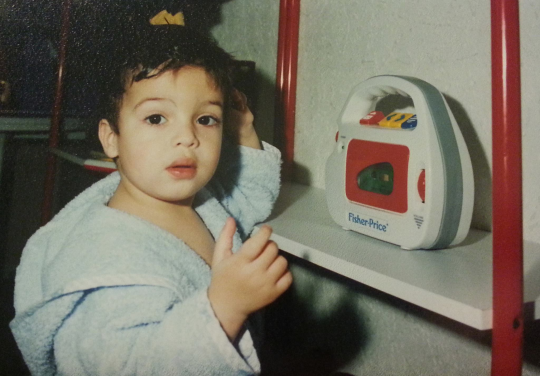
It also turns out that the tape recorder AND the shelf have both survived.
(I don’t know if it still works.)
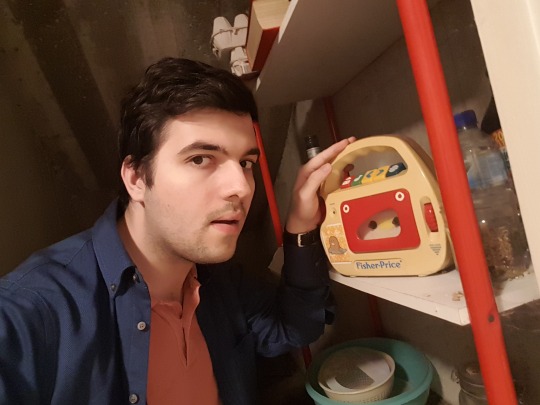
On Wednesday afternoons (school was off) and on the week-ends, I often got to play on the family computer, most of the time with my older brother, who’s the one who introduced me to... well... all of it, really. (Looking back on the games he bought, I can say he had very good tastes.)
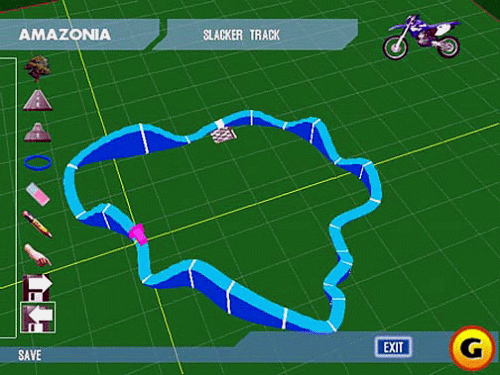
Moto Racer II came with a track editor. It was simple but pretty cool to play around with. You just had to make the track path and elevation; all the scenery was generated by the game. You could draw impossible tracks that overlapped themselves, but the editor wouldn’t let you save them. However, I found out there was a way to play/save them no matter what you did, and I got to experiment with crazy glitches. 85 degree inclines that launched the bike so high you couldn’t see the ground anymore? No problem. Tracks that overlapped themselves several times, causing very strange behaviour at the meeting points? You bet. That stuff made me really curious about how video games worked. I think a lot of my initial interest in games can be traced back to that one moment I figured out how to exploit the track editor...
There was also another game—I think it was Tubular Worlds—that came on floppy disks. I don’t remember what exactly lead me to do it, but I managed to edit the text that was displayed by the installer... I think it was the license agreement bit of it. That got me even more curious as to how computers worked.
Up until some time around my 13th or 14th birthday, during summer break (the last days of June to the first days of September for French pupils), my sister and I would always go on vacation at my grandparents’ home.
The very first console game I ever played was The Legend of Zelda: A Link to the Past on my cousin’s Super Nintendo, who also usually stayed with us. Unlike us, he had quite a few consoles available to him, and brought a couple along. My first time watching and playing this game was absolutely mind-blowing to me. An adventure with a huge game world to explore, so many mysterious things at every corner. “Why are you a pink rabbit now?” “I’m looking for the pearl that will help me not be that.”
Growing up and working in the games industry has taken the magic out of many things in video games... and my curiosity for the medium (and its inner workings) definitely hasn’t helped. I know more obscure technical trivia about older games than I care to admit. But I think this is what is shaping my tastes in video games nowadays... part of it is that I crave story-rich experiences that can bring me back to a, for lack of a better term, “child-like” wonderment. And I know how weird this is going to sound, but I don’t really enjoy “pure gameplay” games as much for that reason. Some of the high-concept ones are great, of course (e.g. Tetris), but I usually can’t enjoy others without a good interwoven narrative. I can’t imagine I would have completed The Talos Principle had it consisted purely of the puzzles without any narrative beats, story bits, and all that. What I’m getting at is, thinking about it, I guess I tend to value the “narrative” side of games pretty highly, because, to me, it’s one of the aspects of the medium that, even if distillable to some formulas, is inherently way more “vague” and “ungraspable”. You can do disassembly on game mechanics and figure out even the most obsure bits of weird technical trivia. You can’t do that to a plot, a universe, characters, etc. or at least nowhere near to the same extent.
You can take a good story and weave it into a number of games, but the opposite is not true. It’s easy to figure out the inner working of gameplay mechanics, and take the magic out of them, but it’s a lot harder to do that for a story, unless it’s fundamentally flawed in some way.
Video games back then seemed a lot bigger than they actually were.
youtube
I got Heart of Darkness as a gift in 1998 or 1999. We used to celebrate Christmas at my grandparents’, so I had to wait a few days to be back home, and to able to put the CD in the computer. But boy was it worth it! Those animated cutscenes! The amazing pixel art animations! The amazing and somewhat disturbing variety of ways in which you can die, most of which gruesome and mildly graphic! And of course, yet again... a strange and outlandish universe that just scratches my itch for it. Well, one of which that forged my taste for them.
I can’t remember exactly when it happened or what it was, but I do remember that at some point we visited some sort of... exposition? Exhibit? Something along those lines. And it had a board games & computer games section. The two that stick out in my mind were Abalone (of which I still have the box somewhere) and what I think was some sort of 2D isometric (MMO?) RPG. I wanna say it was Ultima Online but I recall it looking more primitive than that (it had small maps whose “void” outside them was a single blueish color).
In my last two years of elementary school, there was one big field trip per year. They lasted two weeks, away from family. The first one was to the Alps. The second one was... not too far from where I live now, somewhere on the coast of Brittany! I have tried really hard to find out exactly where it was, as I remember the building and facilities really well, but I was never able to find it again. On a couple occasions, we went on a boat with some kind of... algae harvesters? The smell was extremely strong (burning itself into my memory) and made me sick. The reason I bring them up is because quite a few of my classmates had Game Boy consoles, most of them with, you know, all those accessories, especially the little lights. I remember being amazed at the transparent ones. Play was usually during the off-times, and I watched what my friends were up to, with, of course, a bit of jealousy mixed in. The class traveled by bus, and it took off in the middle of the night; something like 3 or 4 in the morning? It seemed like such a huge deal at the time! Now here I am, writing THESE WORDS at 03:00. Anyway, most of my classmates didn’t fall back asleep and those that had a Game Boy just started playing on them. One of my classmates, however, handed me his whole kit and I got to do pretty much what I wanted with it, with the express condition that I would not overwrite any of his save files. I remember getting reasonably far in Pokémon before I had to give it back to him and my progress was wiped.
During the trip to the Alps, I remember seeing older kids paying for computer time; there was a row of five computers in a small room... and they played Counter-Strike. I had absolutely no idea what it was, and I would forget about it until the moment I’m writing these words, but I was watching with much curiosity.
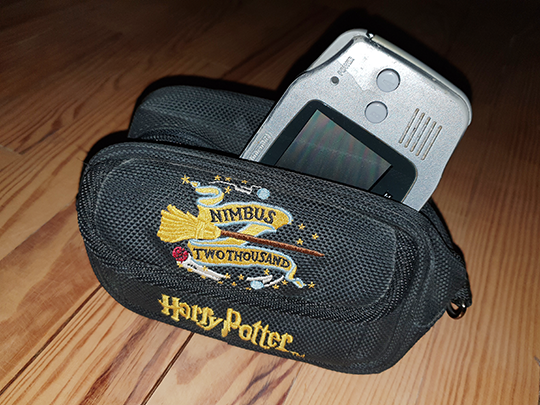
The first time I had my own access to console games was in 2001. The first Harry Potter film had just come out, and at Christmas, I was gifted a Game Boy Advance with the first official game. I just looked it up again and good god, it’s rougher than I remember. The three most memorable GBA games which I then got to play were both Golden Sun(s) and Sword of Mana... especially the latter, with its gorgeous art direction. My dad had a cellphone back then, and I remember sneakily going on there to look up a walkthrough for a tricky part of Golden Sun’s desert bit. Cellphones had access to something called “WAP” internet... very basic stuff, but of course still incredible to me back then.
I eventually got to play another Zelda game on my GBA: Link’s Awakening DX. I have very fond memories of that one because I was bed-ridden with a terrible flu. My fever ran so high that I started having some really funky dreams, delirious half-awake hallucinations/feelings, and one night, I got so hot that I stumbled out of bed and just laid down against the cold tile of the hallway. At 3 in the morning! A crazy time! (Crazy for 11-year-old me.)
(The fever hallucinations were crazy. My bedroom felt like it was three times at big, and I was convinced that a pack of elephants were charging at me from the opposite corner. The “night grain” of my vision felt sharper, amplified. Every touch, my sore body rubbing against the bed covers felt like it was happening twice as much. You know that “Heavy Rain with 300% facial animation” video? Imagine that, but as a feverish feeling. The dreams were on another level entirely. I could spend pages on them, but suffice to say that’s when I had my first dream where I dreamed of dying. There were at least two, actually. The first one was by walking down a strange, blueish metal corridor, then getting in an elevator, and then feeling that intimate convinction that it was leading me to passing over. The second one was in some Myst-like world, straight out of a Roger Dean cover, with some sort of mini-habitat pods floating on a completely undisturbed lake. We were just trapped in them. It just felt like some kind of weird afterlife.)
I also eventually got to play the GBA port of A Link To The Past. My uncle was pretty amused by seeing me play it, as he’d also played the original on SNES before I’d even been born. I asked him for help with a boss (the first Dark World one), but unfortunately, he admitted he didn’t remember much of the game.
We had a skiing holiday around this time. I don’t remember the resort’s or the town’s name, but its sights are burned in my memory. Maybe it’s because, shortly after we arrived, and we went to the ski rental place, I almost fainted and puked on myself, supposedly from the low oxygen. It also turned out that the bedroom my parents had rented unexpectedly came with a SNES in the drawer under the tiny TV. The game: Super Mario World. I got sick at one point and got to stay in and play it. This was also the holiday where I developed a fondness for iced tea, although back then the most common brand left an awful aftertaste in your mouth that just made you even more thirsty.
We got a new PC in December of 2004. Ditching the old Windows 98 SE (yep, the OS had been upgraded in... 2002, I think?). Look at how old-school this looks. The computer office room was in the basement. Even with the blur job that I applied to the monitor for privacy reasons, you can still tell that this is the XP file explorer:
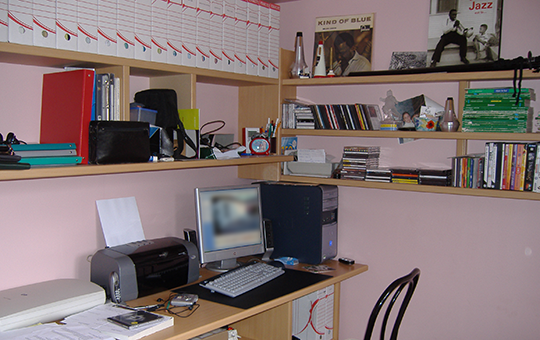
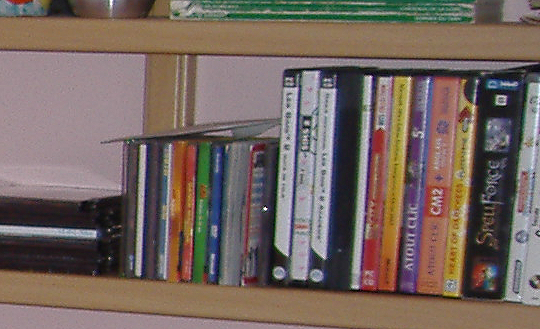
A look at what the old DSLR managed to capture on the shelf reveals some more of the games that were available to me back then: a bunch of educational software, The Sims 2, and SpellForce Gold.
I might be misremembering but I think they were our Christmas gifts for that year; we both got to pick one game. I had no idea what I wanted, really, but out of all the boxes at (what I think was) the local Fnac store, it was SpellForce that stood out to me the most. Having watched Lord of the Rings the year prior might have been a factor. I somewhat understood Age of Empires years before that, but SpellForce? Man, I loved the hell out of SpellForce. Imagine a top-down RPG that can also be played from a third-person perspective. And with the concept of... hero units... wait a second... now that reminds me of Dota.
Imagine playing a Dota hero with lots of micro-management and being able to build a whole base on new maps. And sometimes visiting very RPG-ish sections (my favorites!) with very little top-down strategy bits, towns, etc. like Siltbreaker. I guess this game was somewhat like an alternate, single-player Dota if you look at it from the right angle. (Not the third-person one.)
I do remember being very excited when I found out that it, too, came with a level editor. I never figured it out, though. I only ever got as far as making a nice landscape for my island, and that was it!
A couple weeks after, it was Christmas; my sister and I got our first modern PC game: The Sims 2. It didn’t run super well—most games didn’t, because the nVidia GeForce FX 5200 wasn’t very good. But that didn’t stop me or my sister from going absolutely nuts with the game. This video has the timestamp of 09 January 2005, and it is the first video I’ve ever made with a computer. Less than two weeks after we got the game, I was already neck-deep in creating stuff.
Not that it was particularly good, of course. This is a video that meets all of the “early YouTube Windows Movie Maker clichés”.
youtube
Speaking of YouTube, I did register an account there pretty early on, in August of 2006. I’ve been through all of it. I remember every single layout change. I also started using Sony Vegas around that time. It felt so complex and advanced back then! And I’m still using it today. Besides Windows, Vegas Pro is very likely to be the piece of software that I’ve been using for the longest time.
I don’t have a video on YouTube from before 2009, because I decided to delete all of them out of embarassment. They were mostly Super Mario 64 machinima. It’s as bad as it sounds. The reason I bring that up right now, though, is that it makes the “first” video of my account the last one I made with the Sims 2.
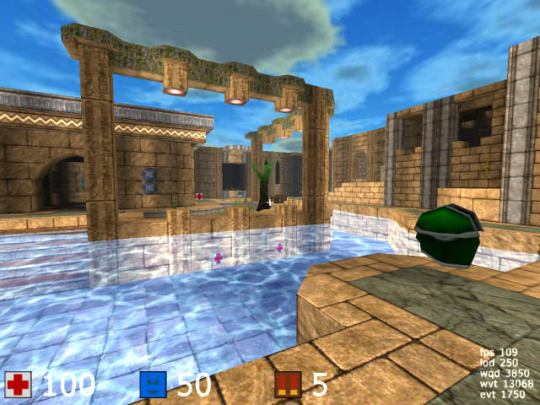
But before I get too far ahead with my early YouTube days, let me go backwards a bit. We got hooked up to the Internet some time in late 2005. It was RTC (dialup), 56 kbps. my first steps into the Internet led me to the Cube engine. Mostly because back then my dad would purchase computer magazines (which were genuinely helpful back then), and came with CDs of common downloadable software for those without Internet connections. One of them linked to Cube. I think it was using either this very same screenshot, or a very similar one, on the same map.
The amazing thing about Cube is not only that it was open-source and moddable, but had map editing built-in the game. The mode was toggled on with a single key press. You could even edit maps cooperatively with other people. Multiplayer mapping! How cool is that?! And the idea of a game that enabled so much creation was amazing to me, so I downloaded it right away. (Over the course of several hours, 30 MiB being large for dialup.)
I made lots of bad maps that never fulfilled the definition of “good level” or “good gameplay”, not having any idea how “game design” meant, or what it even was. But I made places. Places that I could call my own. “Virtual homes”. I still distinctively remember the first map I ever made, even though no trace of it survives to this day. In the second smallest map size possible, I’d made a tower surrounded by a moat and a few smaller cozy towers, with lots of nice colored lighting. This, along with the distinctive skyboxes and intriguing music, made me feel like I’d made my home in a strange new world.
At some point later down the line, I made a kinda-decent singleplayer level. It was very linear, but one of the two lead developers of the game played it and told me he liked it a lot! Of course, half of that statement was probably “to be nice”, but it was really validating and encouraging. And I’m glad they were like that. Because I remember being annoying to some other mappers in the Sauerbraten community (the follow-up to Cube, more advanced technically), who couldn’t wrap their heads around my absolutely god awful texturing work and complete lack of level “design”. Honestly, sometimes, I actually kinda feel like trying to track a couple of them down and being like, “yeah, remember that annoying kid? That was me. Sorry you had to deal with 14-year-old me.”
youtube
At some point, I stumbled upon a mod called Cube Legends. It was a heavily Zelda-inspired “total conversion”; a term reserved for mods that are the moddiest mods and try to take away as much of the original foundation as possible. It featured lots of evocative MIDI music by the Norwegian composer Bjørn Lynne. Fun fact: the .mid files are still available officially from his website!
This was at the crossroad of many of my interests. It was yet another piece of the puzzle. As a quick side note, this is why Zelda is the first series that I name in the title of this post, even though I... never really thought of myself as a Zelda fan. It’s not that it’s one of the game series that I like the most, it’s just that, before I started writing this, I’d never realized how far-reaching its influence had been in my life, both in overt and subtle ways, especially during my formative years.
And despite how clearly unfinished, how much of a “draft” Cube Legends was, I could see what it was trying to do. I could see the author’s intent. And I’m still listening to Bjørn Lynne’s music today.
The Cube Engine and its forums were a big part of why I started speaking English so well. Compared to most French people, I mean. We’re notoriously bad with the English language, and so was I up until then. But having this much hands-on practice proved to be immensely valuable. And so, I can say that the game and its community have therefore had long-lasting impacts in my life.
I also tried out a bunch of N64 games via emulation, bringing me right back in that bedroom at my grandparents’ house, with my cousin. Though he did not have either N64 Zelda game back then.
The first online forum I ever joined was a Zelda fan site’s. There are two noteworthy things to say here:
It was managed by a woman who, during my stay in the community, graduated from her animation degree. At this stage I had absolutely no idea that this was going to be the line of work I would eventually pursue!
I recently ran into the former head moderator of the forums. (I don’t know when the community died.) One of the Dota players on my friends list invited him because I was like “hmm, I wanna go as 3, not as 2 players today”. His nickname very vaguely reminded me of something, a weird hunch I couldn’t place. Half an hour into the game, he said “hey Max... this might be a long shot, but did you ever visit [forum]?” and then I immediately yelled “OH MY GOD—IT IS YOU.” The world is a small place.
Access to the computer was sometimes tricky. I didn’t always have good grades, and of course, “punishment” (not sure the word is appropriate, hence the quotes, but you get the idea) often involved locking me out of the computer room. Of course, most times, I ended up trying to find the key instead. I needed my escape from the real world. (You better believe it’s Tangent Time.)
I was always told I was the “smart kid”, because I “understood things faster” than my classmates. So they made me skip two grades ahead. This made me enter high school at nine years old. The consequences were awful (I was even more of the typical nerdy kid that wouldn’t fit in), and I wish it had never happened. Over the years, I finally understood: I wasn’t more intelligent. I merely had the chance to have been able to grow up with an older brother who’d instilled a sense of curiosity, critical thinking, and taste in books that were ahead of my age and reading level. This situation—and its opposite—is what I believe accounts for the difference in how well kids get to learn. It’s not innate talent, it’s not genetics (as some racists would like you to believe). It’s parenting and privilege.
And that’s why I’ll always be an outspoken proponent for any piece of media that tries to instill critical thinking and curiosity in its viewer, reader, or player.
But I digress.
Well, I’ve been digressing a lot, really, but games aren’t everything and after all, this post is about the context in which I played those games. Otherwise I reckon I would’ve just made a simple list.
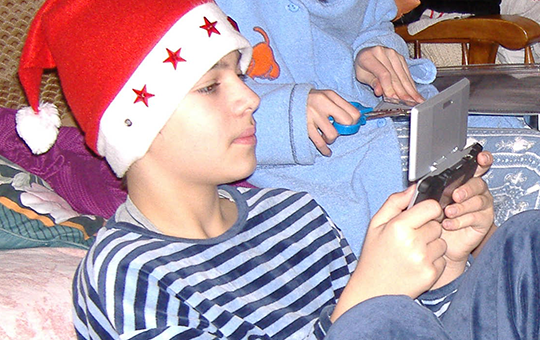
I eventually got a Nintendo DS for Christmas, along with Mario Kart DS. My sister had gotten her own just around the time when it released... she had the Nintendogs bundle. We had also upgraded to proper ADSL, what I think was about a ~5 megabits download speed. The Nintendo DS supported wi-fi, which was still relatively rare compared to today. In fact, Nintendo sold a USB wireless adapter to help with that issue—our ISP-supplied modem-router did not have any wireless capabilities. I couldn’t get it the adapter work and I remember I got help from a really kind stranger who knew a lot about networking—to a point that it seemed like wizardry to me.
I remember I got a “discman” as a gift some time around that point. In fact, I still have it. Check out the stickers I put on it! I think those came from the Sims 2 DVD box and/or one of its add-ons.
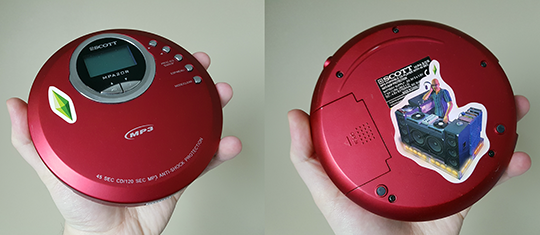
I burned a lot of discs. In fact, in the stack of burned CDs/DVDs that I found (with the really bad Sims movies somewhere in there), I found at least three discs that had the Zelda album Hyrule Symphony burned in, each with different additional tracks. Some were straight-up MIDI files from vgmusic.com...! And speaking (again) of Zelda, when the Wii came out, Twilight Princess utterly blew my mind. I never got the game or the console, but damn did I yearn badly for it. I listened to the main theme of the game a lot, which didn’t help. I eventually got to play the first few hours at a friend’s place.
At some point, we’d upgraded the family computer to something with a bit more horsepower. It had a GeForce 8500 GT inside, which was eventually upgraded to a 9600 GT after the card failed for some reason. It could also dual-boot between XP and Vista. I stuck with that computer until 2011.
We moved to where I currently live in 2007. I’ve been here over a decade! And before we’d even fully finished unpacking, I was on the floor of the room that is now my office, with the computer on the ground and the monitor on a cardboard box, playing a pirated copy of... Half-Life! It was given to me by my cousin. It took me that long to find out about the series. It’s the first Valve game I played. I also later heard about the Orange Box, but mostly about Portal. Which I also pirated and played. I distinctly remember being very puzzled by the options menu: I thought it was glitched or broken, as changing settings froze the game. Turns out the Source engine had to chug for a little while, like a city car in countryside mud, as it reloaded a bunch of stuff. Patience is a virtue...
But then, something serious happened.
In the afternoon of 25 December 2007, I started having a bit of a dull stomach pain. I didn’t think much of it. Figured maybe I’d eaten too many Christmas chocolates and it’d go away. It didn’t. It progressively deteriorated into a high fever where I had trouble walking and my tummy really hurt; especially if you pressed on it. My parents tried to gently get me to eat something nice on New Year’s Eve, but it didn’t stay in very long. I could only feed myself with lemonade and painkiller. Eventually, the doctor decided I should get blood tests done as soon as possible. And I remember that day very clearly.
I was already up at 6:30 in the morning. Back then, The Daily Show aired on the French TV channel Canal+, so I was watching that, lying in the couch while waiting for my mom to get up and drive me to my appointment, at 7:00. It was just two streets away, but there was no way I could walk there. At around noon, the doctor called and told my mom: “get your son to the emergency room now.”
Long story short, part of my intestines nuked themselves into oblivion, causing acute peritonitis. To give you an idea, that’s something with a double-digit fatality rate. Had we waited maybe a day or two more, I would not be here writing this. They kind of blew up. I had an enormous abcess attached to a bunch of my organs. I had to be operated on with only weak local anaesthetics as they tried to start draining the abscess. It is, to date, by far the most painful thing that has ever happened to me. It was bad enough that the hospital doctor that was on my case told me that I was pretty much a case worthy to be in textbooks. I even had medical students come into my hospital room about it! They were very nice.
This whole affair lasted over a month. I became intimately familiar with TV schedules. And thankfully, I had my DS to keep me company. At the time, I was pretty big into the Tony Hawk DS games. They were genuinely good. They had extensive customization, really great replayability, etc. you get the idea. I think I even got pretty high on the online leaderboards at some point. I didn’t have much to do on some days besides lying down in pain while perfecting my scoring and combo strategies. I think Downhill Jam might’ve been my favorite.
My case was bad enough that they were unable to do something due to the sad state of my insides during the last surgery of my stay. I was told that I could come back in a few months for a checkup, and potentially a “cleanup” operation that would fix me up for good. I came back in late June of 2008, got the operation, and... woke up in my hospital room surrounded by, like, nine doctors, and hooked up to a morphine machine that I could trigger on command. Apparently something had gone wrong during the operation, but they never told me what. I wasn’t legally an adult, so they didn’t have to tell me. I suspect it’s somewhere in some medical files, but I never bothered to dig up through my parents’ archives, or ask the hospital. And I think I would rather not know. But anyway, that was almost three more weeks in the hospital. And it sucked even more that time because, you see, hospital beds do not “breathe” like regular beds do. The air can’t go through. Let’s say I’m intimately familiar with the smell of back sweat forever.
When I got out, my mom stopped by a supermarket on the way home. And that is when I bought The Orange Box, completely on a whim, and made my Steam account. Why? Because it was orange and stood out on the shelf.
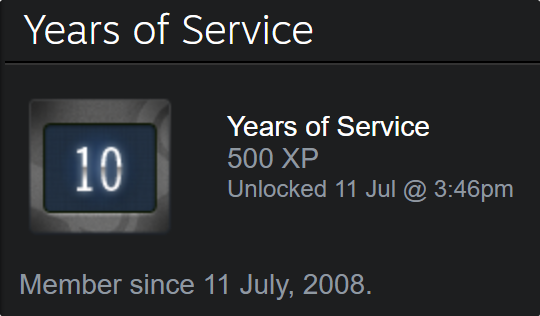
(As a side note, that was the whole bit I started writing first, and that made me initially title this post “growing pains”. First, because I’m bad at titles. Second, because not that I didn’t have them otherwise (ow oof ouch my knees), but that was literally the most painful episode of my entire life thus far and it ended in a comically-unrelated, high-impact, life-changing decision. Just me picking up The Orange Box after two awful hospital stays... led me to where I am today.)
While I was recovering, I also started playing EarthBound! Another bit of a life-changer, that one. To a lesser extent, but still. I was immediately enamored by its unique tone. Giygas really really really creeped me out for a while afterwards though. I still get unsettled if I hear its noises sometimes.
I later bought Garry’s Mod (after convincing my mom that it was a “great creative toolbox that only cost ten bucks!”), and, well, the rest is history. By which I mean, a lot of my work and gaming activity since 2009 is still up and browsable. But there are still a few things to talk about.
In 2009, I bought my first computer with YouTube ad money: the Asus eee PC 1005HA-H. By modern standards, it’s... not very powerful. The processor in my current desktop machine is nearly 50 times as fast as its Atom N280. It had only one gigabyte of RAM, Windows 7 Basic Edition, and an integrated GPU barely worthy of the name; Intel didn’t care much for 3D in their chips back then. The GMA 945 didn’t even have hardware support for Transform & Lighting.
But I made it work, damn it. I made that machine run so much stuff. I played countless Half-Life and Half-Life 2 mods on it—though, due to the CPU overhead on geometry, some of those were trickier. I think one of the most memorable ones I played was Mistake of Pythagoras; very surreal, very rough, but I still remember it so clearly. I later played The Longest Journey on it, in the middle of winter. It was a very cozy and memorable experience. (And another one that’s an adventure wonderful outlandish alien universe. LOVE THOSE.)
I did more than playing games on it, though...
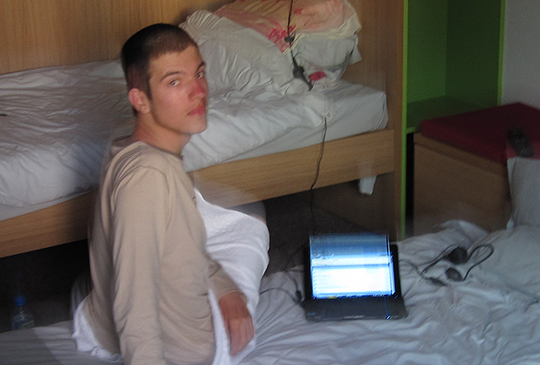
This is me sitting, sunburned on the nose, in an apartment room, on 06 August 2010. This was in the Pyrénées, at the border between France and Spain. We had a vacation with daily hiking. Some of the landscapes we visited reminded me very strongly of those from Lost Eden, way up the page...
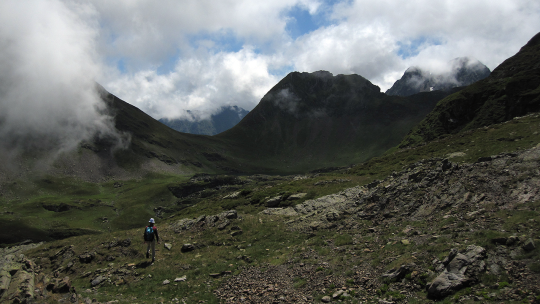
So, you see, I had 3ds Max running on that machine. The Source SDK as well. Sony Vegas. All of it was slow; you bet I had to use some workarounds to squeeze performance out of software, and that I had to keep a close, watchful eye on RAM usage. But I worked on this thing. I really did! I animated this video’s facial animation bits (warning: this is old & bad) on the eee PC, during the evenings of the trip, when we were back at our accomodation. The Faceposer tool in the Source SDK really worked well on that machine.
I also animated an entire video solely on the machine (warning: also old and bad). It had to be rendered on the desktop computer... but every single bit of the animation was crafted on the eee PC.
I made it work.
Speaking of software that did not run well: around that time, I also played the original Crysis. The “but can it run Crysis?” joke was very much justified back then. I had to edit configuration files by hand so that I could run the game in 640x480... because I wanted to keep most of the high-end settings enabled. The motion blur was delicious, and it blew my mind that the effect made the game feel this smooth, despite wobbling around in the 20 to 30 fps range.
Alright. It’s time to finish writing this damn post and publish it at last, so I’m going to close it out by listing some more memories and games that I couldn’t work in up there.
Advance Wars. Strategy game on GBA with a top-down level editor. You better believe I was all over the editor right away.
BioShock. When we got the 2007 desktop computer, it was one of the first games I tried. Well, its demo, to be precise. Its tech and graphics blew my mind, enough that I saved up to buy the full game. This was before I had a Steam account; I got a boxed copy! I think it might have been the last boxed game I ever bought? It had a really nice metal case. The themes and political messages of the game flew way over my head, though.
Mirror’s Edge. The art direction was completely fascinating to me, and it introduced me to Solar Fields’ music; my most listened artist this decade, by a long shot.
L.A. Noire. I lost myself in its stories and investigations, and then, I did it all again, with my sister at the helm. I very rarely play games twice (directly or indirectly), which I figure is worth mentioning.
Zeno Clash. It was weird and full of soul, had cool music, and cool cutscenes. It inspired me a lot in my early animation days.
Skyward Sword. Yep, going back to Zelda on that one. The whole game was pretty good, and I’m still thinking about how amazing its art direction was. Look up screenshots of it running in HD on an emulator... it’s outstanding. But there’s a portion of the game that stands tall above the rest: the Lanayru Sand Sea. It managed to create a really striking atmosphere in many aspects, through and through. I still think about it from time to time, especially when its music comes on in shuffle mode.
Wandersong. A very recent pick, but it was absolutely a life-changing one. That game is an anti-depressant, a vaccine against cynicism, a lone bright and optimist voice.
I realize now this is basically a “flawed but interesting and impactful games” list. With “can establish its atmosphere very well” as a big criteria. (A segment of video games that is absolutely worth exploring.)
I don’t know if I’ll ever make my own video game. I have a few ideas floating around and I tried prototyping some stuff, though my limited programming abilities stood in my way. But either way, if it happens one day, I hope I’ll manage to channel all those years of games into the CULMINATION OF WHAT I LIKE. Something along those lines, I reckon.
20 notes
·
View notes
Link
The following blog post, unless otherwise noted, was written by a member of Gamasutra’s community. The thoughts and opinions expressed are those of the writer and not Gamasutra or its parent company.
Original posted on the Final Game Studio blog
Making a sustainable living off indie games is difficult.
Whether you believe in the indiepocalypse or not, please take that statement as fact. There are hundreds, if not thousands, of new games and apps being being released every week and even if you do manage to rise above the noise and have a hit, that is no guarantee you will manage to do the same again next time.
But that's probably not going to stop you making games - it's not stopping me. Not a single day has passed in the last decade when I haven't had an idea for a cool or interesting game I want to make and I am determined to make at least some of them. But personally, I want to make fun, polished, completed experiences for players to enjoy - not unfinished game jam prototypes. And I know this might come across as greedy, but I want to do it without quitting my day job, burning through all of my savings, living like a pauper and putting myself through a mental and physical endurance test.
So the question I asked myself last year was, can I make the kind of games I want to make in my spare time?
So, not only do I currently have a full time job - it's a game dev job. I have been working as a software engineer at StoryToys making kids apps for the last 5 and a half years or so. In that time, I have lead the development of over a dozen apps in a variety of engines, worked in multi-disciplined teams with some really talented people and generally learned a lot. The work I get to do is challenging and rewarding, and while it has its ups and downs, I enjoy it and I plan to keep doing it... So why am I writing a post about part time indie game development?
Well, because I'm doing that too and there are a couple of reasons for that;
The first is that as much a I like making kids apps (seriously, seeing a 4 year old jump up and cheer out loud over something you made is an awesome feeling), there are lots of other types of games I want to be making as well. If anything, there are too many other types of games I want to be making, and frankly it's hard to get management to greenlight a tactical rts or dark fantasy rpg when your company's core demographic is 2-10 years old.
The second reason is creative control. While I am very lucky to have a huge amount of creative input into everything I work on at the moment, there are always going to be things you would do differently if you got to call all the shots. It's a very different experience being in complete control of every facet of a game from Marketing to UI and Game Design to Programming.
The final reason I'm making my own indie games part time is the fact that I was doing it anyway - I just wasn't doing it very well. I have been making little game prototypes and thinking through game design ideas in my spare time for years, but I usually didn’t make a lot of progress with them. I'd have an idea, work on it for a few hours or days and then leave it unfinished when something else came up or I hit some part of it I didn't really want to do (looking at you networking code... ). I didn't have a clear goal or a lot of motivation to finish them, so I didn't - and over time that started to really bother me, so I decided to change it.
While I was certainly learning from researching and making all of these prototypes in my spare time, I couldn't shake the feeling that I was just wasting a load of my time and not getting any tangible benefit from it. I wanted to make finished, polished games and release them for people to play and as many of you know, there is a VERY long road from prototype to finished game.
I identified the main reasons I would stop working on something.
Not Fun:
I could discover the game idea just wasn't fun to play - that reason is fine and perfectly valid, and generally becomes obvious after a few hours at most.
Boring Details:
I would hit a part that was a pain in the ass to work on. This was more of a problem - I just don't enjoy coding up certain low level things like setting up a C++ rendering engine.
Scope:
Another big problem was scope - not scope creep, just scope. I usually didn't have clear goals or limitation when I started prototyping something, so I often ended up in a situation where I would find something really fun and then realize my idea would take over a year full time dev work to actually complete ( examples include a multiplayer RTS game and several RPGs with a procedurally generated world and stories ).
Interruptions:
Finally, the biggest hurdle to finishing these prototypes, at least for me, was just leaving them for a while and not coming back to them - maybe a new game came out I wanted to play, or I wanted to work on something else for a while... basically, if I left a project unopened for over a week it was as good as dead.
Clear Goal:
I wanted to make and commercially ship finished games, and I wanted to make them in a (relatively) short amount of time to keep the finish line in sight and my motivation high. I decided I wanted to ship my first game within 6 months of starting on it ( Which meant picking something I thought I could get finished in about a month since I am experienced enough to know how estimation and scope creep work... ).
Plan for the future
I intend to continue making games in the future, so I was willing to front-load some of the work into the first game to start off on the right foot. I designed elements of code/UI/Design to be somewhat re-usable in future games I have planned. I also formed my own company to publish the games under and set up some other boringly-important things like a company website and email.
Work consistently
I knew I needed to work on one game consistently and for me, that meant 2 hours a day, every day, with an extra 8 hours spread over weekends. I have traditionally been very good at making excuses for myself, so to get into the habit, I didn't let myself skip a single day for the first 2 months of work. After that, I relaxed it a bit to allow for, well, a life... but I have been sticking to this schedule pretty well for the last 6 months. To some of you 2 hours might not seem like a lot, but it was the absolute max I was willing to commit to. My day job can be pretty draining at times and I also wanted to make sure I still have time in the evenings to relax, enjoy myself and spend time with my girlfriend.
Enjoy the work
This 2 hour timescale lead me to decide on another rule designed to keep my motivation up and generally make sure I was actually enjoying working on my own games: No feature goes in that I can't make in satisfying 2 hour chunks. At the end of each session, I wanted to commit a fully working/compiling version of my game and feel like I accomplished something useful, whether code art or sound. I have broken this rule a few times and regretted it every time.
Design a game to suit this approach
The short timeline, combined with broken up work schedule, led me to design a game that was not only much smaller in scope that most of my previous prototypes, but also much simpler. The only goal was to make a fun game and any features that weren't going to achieve that or were a pain to implement got cut. That meant no networking, no third party SDKs, no monolithic pieces of cool new tech. That's not to say my games won't have these in the future, I just intend to introduce anything like that over time - maybe one large piece of new tech per project?
So far, things are going great.
I submitted my company's first app ( AuroraBound ) last week to the Apple, GooglePlay and Amazon app stores - It will be released on May 9th. I am also preparing Tizen and Windows store builds this week. AuroraBound is simple, fun, polished and, most importantly to me, I really enjoyed making it - the last 6 months have probably been the most rewarding of my life. I don't expect it to be a large commercial hit (the monetisation model is simplistic and getting PR/featuring for a new app is pretty tough these days), but I don't need it to be.
I have some future updates planned, as well as some ideas for a deluxe desktop version, and after taking a few days off to finally play the new Zelda game I'll start work on my next title. Throughout the entire development of my own game, my work at my day job never slipped (quite the opposite actually, I was able to make use of a few things I had discovered during AuroraBound's development ).
I plan to keep making more and better games in my spare time, and maybe one day I will take the plunge and go Indie full time - but if I do, I'll be doing so with my eyes open, invaluable experience, an existing codebase, a catalog of existing apps and relationships with some the major platform holders.
0 notes
Link
The following blog post, unless otherwise noted, was written by a member of Gamasutra’s community. The thoughts and opinions expressed are those of the writer and not Gamasutra or its parent company.
Original posted on the Final Game Studio blog
Making a sustainable living off indie games is difficult.
Whether you believe in the indiepocalypse or not, please take that statement as fact. There are hundreds, if not thousands, of new games and apps being being released every week and even if you do manage to rise above the noise and have a hit, that is no guarantee you will manage to do the same again next time.
But that's probably not going to stop you making games - it's not stopping me. Not a single day has passed in the last decade when I haven't had an idea for a cool or interesting game I want to make and I am determined to make at least some of them. But personally, I want to make fun, polished, completed experiences for players to enjoy - not unfinished game jam prototypes. And I know this might come across as greedy, but I want to do it without quitting my day job, burning through all of my savings, living like a pauper and putting myself through a mental and physical endurance test.
So the question I asked myself last year was, can I make the kind of games I want to make in my spare time?
So, not only do I currently have a full time job - it's a game dev job. I have been working as a software engineer at StoryToys making kids apps for the last 5 and a half years or so. In that time, I have lead the development of over a dozen apps in a variety of engines, worked in multi-disciplined teams with some really talented people and generally learned a lot. The work I get to do is challenging and rewarding, and while it has its ups and downs, I enjoy it and I plan to keep doing it... So why am I writing a post about part time indie game development?
Well, because I'm doing that too and there are a couple of reasons for that;
The first is that as much a I like making kids apps (seriously, seeing a 4 year old jump up and cheer out loud over something you made is an awesome feeling), there are lots of other types of games I want to be making as well. If anything, there are too many other types of games I want to be making, and frankly it's hard to get management to greenlight a tactical rts or dark fantasy rpg when your company's core demographic is 2-10 years old.
The second reason is creative control. While I am very lucky to have a huge amount of creative input into everything I work on at the moment, there are always going to be things you would do differently if you got to call all the shots. It's a very different experience being in complete control of every facet of a game from Marketing to UI and Game Design to Programming.
The final reason I'm making my own indie games part time is the fact that I was doing it anyway - I just wasn't doing it very well. I have been making little game prototypes and thinking through game design ideas in my spare time for years, but I usually didn’t make a lot of progress with them. I'd have an idea, work on it for a few hours or days and then leave it unfinished when something else came up or I hit some part of it I didn't really want to do (looking at you networking code... ). I didn't have a clear goal or a lot of motivation to finish them, so I didn't - and over time that started to really bother me, so I decided to change it.
While I was certainly learning from researching and making all of these prototypes in my spare time, I couldn't shake the feeling that I was just wasting a load of my time and not getting any tangible benefit from it. I wanted to make finished, polished games and release them for people to play and as many of you know, there is a VERY long road from prototype to finished game.
I identified the main reasons I would stop working on something.
Not Fun:
I could discover the game idea just wasn't fun to play - that reason is fine and perfectly valid, and generally becomes obvious after a few hours at most.
Boring Details:
I would hit a part that was a pain in the ass to work on. This was more of a problem - I just don't enjoy coding up certain low level things like setting up a C++ rendering engine.
Scope:
Another big problem was scope - not scope creep, just scope. I usually didn't have clear goals or limitation when I started prototyping something, so I often ended up in a situation where I would find something really fun and then realize my idea would take over a year full time dev work to actually complete ( examples include a multiplayer RTS game and several RPGs with a procedurally generated world and stories ).
Interruptions:
Finally, the biggest hurdle to finishing these prototypes, at least for me, was just leaving them for a while and not coming back to them - maybe a new game came out I wanted to play, or I wanted to work on something else for a while... basically, if I left a project unopened for over a week it was as good as dead.
Clear Goal:
I wanted to make and commercially ship finished games, and I wanted to make them in a (relatively) short amount of time to keep the finish line in sight and my motivation high. I decided I wanted to ship my first game within 6 months of starting on it ( Which meant picking something I thought I could get finished in about a month since I am experienced enough to know how estimation and scope creep work... ).
Plan for the future
I intend to continue making games in the future, so I was willing to front-load some of the work into the first game to start off on the right foot. I designed elements of code/UI/Design to be somewhat re-usable in future games I have planned. I also formed my own company to publish the games under and set up some other boringly-important things like a company website and email.
Work consistently
I knew I needed to work on one game consistently and for me, that meant 2 hours a day, every day, with an extra 8 hours spread over weekends. I have traditionally been very good at making excuses for myself, so to get into the habit, I didn't let myself skip a single day for the first 2 months of work. After that, I relaxed it a bit to allow for, well, a life... but I have been sticking to this schedule pretty well for the last 6 months. To some of you 2 hours might not seem like a lot, but it was the absolute max I was willing to commit to. My day job can be pretty draining at times and I also wanted to make sure I still have time in the evenings to relax, enjoy myself and spend time with my girlfriend.
Enjoy the work
This 2 hour timescale lead me to decide on another rule designed to keep my motivation up and generally make sure I was actually enjoying working on my own games: No feature goes in that I can't make in satisfying 2 hour chunks. At the end of each session, I wanted to commit a fully working/compiling version of my game and feel like I accomplished something useful, whether code art or sound. I have broken this rule a few times and regretted it every time.
Design a game to suit this approach
The short timeline, combined with broken up work schedule, led me to design a game that was not only much smaller in scope that most of my previous prototypes, but also much simpler. The only goal was to make a fun game and any features that weren't going to achieve that or were a pain to implement got cut. That meant no networking, no third party SDKs, no monolithic pieces of cool new tech. That's not to say my games won't have these in the future, I just intend to introduce anything like that over time - maybe one large piece of new tech per project?
So far, things are going great.
I submitted my company's first app ( AuroraBound ) last week to the Apple, GooglePlay and Amazon app stores - It will be released on May 9th. I am also preparing Tizen and Windows store builds this week. AuroraBound is simple, fun, polished and, most importantly to me, I really enjoyed making it - the last 6 months have probably been the most rewarding of my life. I don't expect it to be a large commercial hit (the monetisation model is simplistic and getting PR/featuring for a new app is pretty tough these days), but I don't need it to be.
I have some future updates planned, as well as some ideas for a deluxe desktop version, and after taking a few days off to finally play the new Zelda game I'll start work on my next title. Throughout the entire development of my own game, my work at my day job never slipped (quite the opposite actually, I was able to make use of a few things I had discovered during AuroraBound's development ).
I plan to keep making more and better games in my spare time, and maybe one day I will take the plunge and go Indie full time - but if I do, I'll be doing so with my eyes open, invaluable experience, an existing codebase, a catalog of existing apps and relationships with some the major platform holders.
0 notes